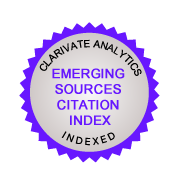Development of critical thinking through communicative skill in Higher Education: a reflective proposal
DOI:
https://doi.org/10.24310/innoeduca.2018.v4i1.3592Keywords:
Initial Teacher Training, Critical Thinking, Communicative Skill, Reflective TeachingAbstract
The aim of this article is to present a cross-sectional research program for a preservice education degree. Its goal is to analyse the learning development of the students that attend the preservice teacher education for pre-school teachers. Throughout their degree, students should be trained in different skills that allow them to become good people and good professionals. But, what is the process through which students acquire critical thinking and communication skills that will enable them to become teachers? In what way do students self-regulate their linguistic, oral and written skills? Are they aware and critical of their own learning in this area? In this project we want to observe the process that our students follow to develop these issues. For this reason, the study of metacognitive processes that allow the crystallization of knowledge and linguistic skills is considered. This analysis is obtained through reflective processes. An investigation is planned for a period of 2 years. The methodology that will be implemented is a mixed longitudinal model (qualitative, quantitative). It is expected to provide information on the perception of students of Early Childhood Education on the development of their linguistic and communicative competence. In this article, we intend to describe the design of the research, the instrument developed and the first results of qualitative nature. Finally, the need to improve the reflection processes of the students of the Early Childhood Education degree is revealed from results obtained.
Downloads
Metrics
Publication Facts
Reviewer profiles N/A
Author statements
Indexed in
-
—
- Academic society
- N/A
- Publisher
- Universidad de Málaga
References
Aloso Tapia, J., y Montero García-Celay, I. (2008). Orientación motivacional y estrategias motivadoras para el aprendizaje. En C. Coll, J. Palacios, y Á. Marchesi, Desarrollo Psicológico y educación 2. Psicología de la educación escolar (pp. 259-305). Madrid: Alianza.
Bisquerra Alzina, R. (2004). Metodlogía de la investigación educativa. Madrid: La Muralla.
Bruner, J. (1997). La educación, puerta de la cultura. Madrid: Visor.
Domingo Roget, À. (2013). Práctica reflexiva para docentes. de la reflexión ocasional a la reflexión metodológica. Saarbrücken: Publicia.
Gallardo-Paúls, B. (2008). Las huellas lingüísticas de la teoría de la mente: intersubjetividad y enunciación en el trastorno por déficit de atención/hiperactividad. Rev Neurol, 46 (Supl. 1), 29-35.
Huertas, J., Alonso Tapia, J., Trías, D., Ardura, A., y García, E. (2011). Los escenarios académicos, las identidades de los estudiantes universitarios y el movimiento y cambio de las orientaciones motivacionales entre ellos. En C. Monereo, y J. Pozo, La identidad en psicología de la Educación (pp. 141- 153). Madrid: Narcea.
Le Fevre, D. (2010). Changing TACK: Talking about Change knowledge for professional learning. En H. Timperley, y J. Parr, Weaving evidence, inquiry and standards to build better schools (pp. 71-92). Wellington: NZCER.
Miras, M. (2008). Afectos, emociones, atribuciones y expectativas: el sentido del aprendizaje escolar. En C. Coll, J. Palacios, y A. Marchesi, desarrollo psicológico y educaciíb 2. Psicología de la educación escolar (pp. 309-325). Madrid: Aliabza.
Monereo, C., y Badia, A. (2011). Los heterónimos del docente. Identidad, selfs y enseñanza. En C. Monereo, y J. Poso, La identidad en psicología de la educación (pp. 57-76). Madrid: Narcea.
Monereo, C., y Castelló, M. (1997). Las estrategias de aprendizaje. Cómo incorporarlas a la práctica educativa. Barcelona: Edebé.
Páez, M. y Puig, J.M. (2013). La reflexión en el Aprendizaje-Servicio. Revista Internacional de Educación para la Justicia Social (RIEJS), 2(2), 13-32.
Rubio Hurtado, M., Galvan Fernández, C., y Rodríguez Illera, J. (2013). EDUTEC. Revista Electrónica de Tecnología Educativa. http://edutec.rediris.es/Revelec2/Revelec43/propuesta_didactica_portafolios_digitales_educacion_superior.html
Schön, D. (1992). La formación de profesionales reflexivos. Hacia un nuevo diseño de la enseñanza y el aprendizaje de las reflexiones. Barcelona: Paidós.
Vilà Baños, R., y Aneas, A. (2013). Los seminarios de práctica reflexiva en el Practicum de Pedagogía de la Universidad de Barcelona. Bordón, 65(3), 165-181.
Vila Mendiburu, I. (1999). Jerome Bruner i l'adquisició del llenguatge. Temps d'Educació, 21, 77-90.
Vygotsky, L. (2012). Pensamiento y lenguaje. Barcelona: Paidós.
Woollfolk, A., Hughes, M., y Walkup, V. (2008). Motivation in Learning and Teaching. En A. Woolfolk, M. Hughes, y V. Walkup, Psychology in Education (pp. 437-480). Harlow: Pearson.
Downloads
Additional Files
Published
How to Cite
Issue
Section
License
All contents published by Innoeduca. International Journal of Technology and Educational Innovation are subject to Creative Commons Attribution-Nocomercial-NoDerivatives 4.0 International License, whose complete text can be consulted at https://creativecommons.org/licenses/by-nc-nd/4.0/legalcode. Thus, copying, distribution, public communication, derivative works and commercial use of content are permitted as of the aforementioned issue provided that the source and the author of the text are cited.
It is the responsibility of the authors to obtain the necessary permits for images that are subject to copyright.

This work is licensed under a Creative Commons Attribution-NonCommercial-NoDerivatives 4.0 International License.












242.png)








